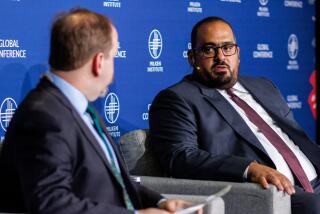Yamani Says Arab Oil Profits May Be Invested in U.S.
- Share via
Middle East oil producers expect a wave of price increases in the 1990s and the revenues could be invested in western nations such as the United States, former Saudi Arabian oil minister Sheik Ahmed Zaki Yamani said here Sunday.
“I hope they do” invest oil revenues in other countries, Yamani told a standing-room-only audience at the Islamic Center of Southern California.
Yamani’s remarks came in response to a question from the audience about whether oil-rich nations would take a cue from the Japanese, Canadians and other foreign investors and attempt to extend their international influence through an economic stake in the western world, particularly in the United States.
He noted that during the oil crisis and price increases of the 1970s, the producing nations used their new revenues on their own infrastructure, such as roads and schools.
“Now,” said the 58-year-old Harvard-educated attorney, who was in Los Angeles for two days on a visit organized by the Muslim Public Affairs Council, “we expect another round in the 1990s when demand for oil will grow and prices will go up.”
It was his expectation, Yamani said, that this new accumulation of oil wealth would be invested more in the foreign marketplace, rather than being recycled internally.
Yamani is a former chairman of the Organization of Petroleum Exporting Countries (OPEC). He lost his job as Saudi oil minister in 1986.
In other news, Associated Press reported that a study released Sunday by Gulf International Bank in Bahrain said oil-producing Gulf countries are linking up with refineries and retailers around the world in an effort to ensure secure outlets for their crude.
The trend could make OPEC “less relevant, at least in its ability to fix crude oil prices,” said the study. The study contended that integrated producers will focus more on the prices of refined products rather than crude.
“As the countries with large excess capacity make more inroads into global . . . integration, they will find their interests diverging from the rest of OPEC and more in common with the major oil companies,” said the study.
For example, last year Saudi Arabia signed a 50% partnership deal with U.S. oil giant Texaco Inc. that covers three refineries and 11,450 retail stations in 23 states. The venture guarantees an outlet for an estimated 615,000 barrels per day of Saudi crude, the study said.
Kuwait is guaranteed some 250,000 barrels per day through refineries and retail stations that it purchased outright in the United States and Northern Europe.
In a separate report, Associated Press said OPEC oil production in October was well over its target and at its highest level all year. The estimate came from the Monthly Oil Market Report published by the International Energy Agency, which said the cartel’s October output soared to 22.9 million barrels a day, 500,000 barrels more than in September. OPEC’s daily target is 20.5 million barrels a day for the last quarter of 1989.
More to Read
Sign up for Essential California
The most important California stories and recommendations in your inbox every morning.
You may occasionally receive promotional content from the Los Angeles Times.









